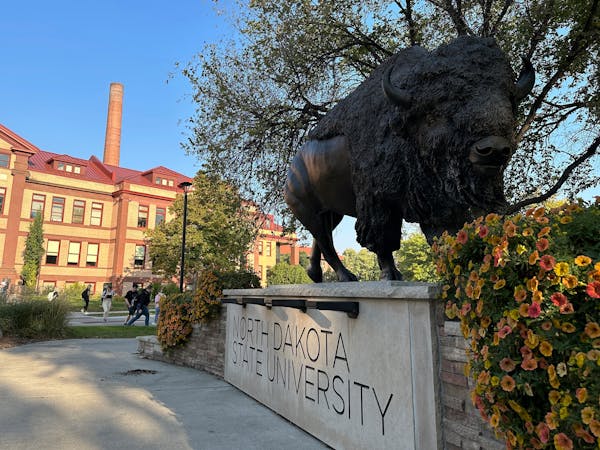South Dakota officials are ending their longstanding reciprocity agreement and dropping tuition rates for Minnesota residents as the competition to recruit college students intensifies.
The change means Minnesota residents could pay less than they had expected to attend a public university in South Dakota. Meanwhile, some South Dakota residents could pay more to attend Minnesota schools in the future, though school leaders say they'll honor current rates for students studying here now.
"The decision to get rid of the reciprocity agreement was actually so we could reduce the cost and make college more affordable to Minnesota students looking to come to South Dakota," said Nathan Lukkes, executive director of the South Dakota Board of Regents, which oversees the state's six public universities.
Since 1978, the two states have had some form of reciprocity agreement that allows residents in both states to receive discounted tuition at public schools, compared with people coming there from other parts of the nation. In recent years, about 3,400 Minnesotans chose to attend college in South Dakota, while nearly 1,000 South Dakota residents attended Minnesota schools. Students paid the higher of the two states' resident-tuition rates, which varied based on the type of institution they were attending.
But with college enrollments across the country declining and the number of high school graduates expected to drop in coming years, competition to recruit students is escalating. Colleges along Minnesota's western border have launched programs to retain students and countered with a new free tuition program in Minnesota. North Dakota State University announced last year that it would try to match Minnesota's program.
Minnesota lawmakers last year created the North Star Promise program, which offers free tuition and fees to Minnesota residents who attend a public school in the state and whose families make less than $80,000. Lawmakers said, among other things, that they wanted to encourage students to stay in Minnesota.
"Certainly, when Minnesota announced the North Star Promise program last year, it caused the [South Dakota] Board of Regents to re-evaluate the landscape and make sure we were maintaining our competitive advantage," Lukkes said.
Minnesota residents at public universities in South Dakota paid an average of $10,780 in tuition and fees under the reciprocity agreement. With the new rates, they'll pay about $1,400 less, Lukkes said.
Minnesota's two public higher education systems set their own tuition rates. At the University of Minnesota's flagship Twin Cities campus, undergraduate tuition runs about $14,500 per year for residents and about $34,400 for non-residents.
Interim U President Jeff Ettinger said in a regents meeting last week that "we are committed to ensuring that current South Dakota students will have their reciprocity rates continue through their graduation." He said they'll also offer the rate to South Dakota students who applied to start their undergraduate studies at the U this fall "because this news comes so late in the admissions cycle."
The U is forming work groups to decide how it should approach future years and rates for graduate and professional programs.
Leaders with the Minnesota State system of colleges and universities said most of their 33 schools charge the same for residents and non-residents.
"Existing South Dakota students will be grandfathered into the lower rate if they are getting one, and other students may be granted the Minnesota resident rate based on other considerations," Bill Maki, vice chancellor for finance and facilities, said in a statement.
Leaders from higher education institutions in both states said students with questions about their college costs should contact the financial aid offices at the institutions they're attending or where they have applied.
"You may hear news like this and it creates a panic," said Keith Hovis, spokesperson for the Minnesota Office of Higher Education. But students might find that "the impact is minimal or there are additional resources available to you."

Walz weighs in on canceled Minnesota cannabis license lottery: Litigation 'happens in every state'

Gov. Tim Walz calls for tougher Medicaid fraud penalties as FBI investigates autism centers

Minnesota abandons early cannabis lottery, retail pot sales likely to start later than expected

Minnesota's first lottery for cannabis business licenses delayed amid litigation

